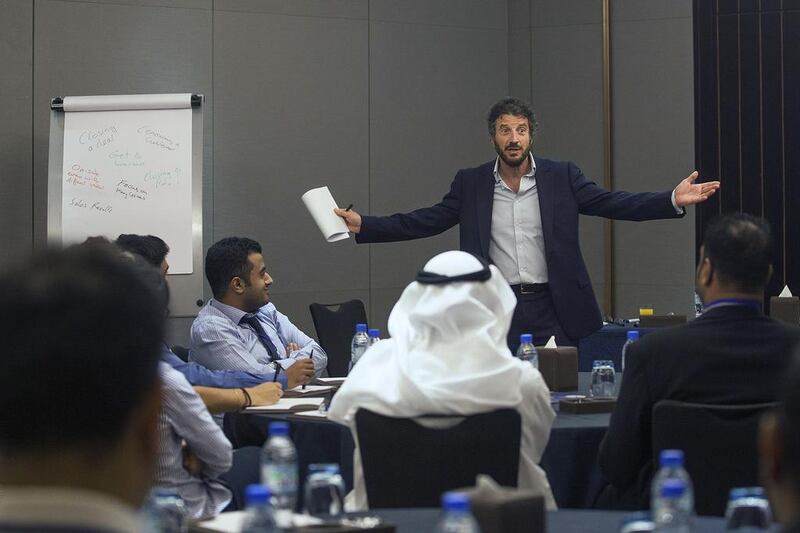It was a great shock to Tom Flatau when his wife demanded a divorce. “It came quite out of the blue and I had no idea how to handle it. We had two children and a house, so there was a lot at stake. I didn’t think fighting was a good idea, so I wanted to negotiate a settlement. But there was nobody I could find who actually taught people how to negotiate.”
Mr Flatau decided to develop a new course through his management training business, Teamworking International, called “the divorce negotiator”. That was 15 years ago. A year later, he had adapted the course to suit the commercial world.
These days, Mr Flatau travels the world delivering seminars on how to become a “black belt negotiator”.
“Now I work for oil companies, banks and engineering companies. What’s at stake if they negotiate badly is huge amounts of money”, he explains.
Mr Flatau’s seminar, which he will be delivering in Dubai on June 10, focuses on the latest neuroscientific research on what makes people buy.
“Most people when they negotiate will go in with the facts and information and think that will win the day. But research shows that actually, it’s our emotional brain that makes the decisions.”
Mr Flatau recommends first building up rapport: “People buy from those they like. The visual imagery you use is incredibly important, as is the language. The brain loves contrast, so if for instance you tell people ‘we’re one of the leading training providers’, the brain won’t be interested. But if you make a bold statement like ‘we’re the only training provider in the Middle East that applies neuroscience to sales training’ – instantly the brain picks it up because the brain is always looking for remarkable things.
“When we used to live in caves, we were always looking for threats. If it’s business as usual – a few gazelles munching grass – that’s not going to be noteworthy. If we smell or see a tiger, we’re going to suddenly prick our ears up and pay attention because the brain’s always looking for change that’s a threat. It’s looking for contrast, because that’s what helps you survive.”
How people negotiate often depends on the gender and nationality of the person they’re dealing with. But Mr Flatau cautions against summing someone up based on these stereotypes.
“It’s too dangerous. If you’re sitting with a female and you make an assumption about how she’ll negotiate based on her gender and she doesn’t do that, you’ve lost the deal,” explains Mr Flatau, who lives in Lymington on the south coast of England. “People ask ‘how should you negotiate with Arabs versus Indians?’ – but giving advice on this would involve using gross oversimplifications. Someone from rural India is going to behave very differently from someone from Mumbai. And someone educated overseas is different too. Also it depends on the age of the negotiate: when I negotiate with my kids, I can’t use the same approach as when negotiating with someone my own age.”
To deduce whether someone will be a soft touch at the negotiating table, Mr Flatau recommends asking them lots of questions at the outset. “People give a lot away when you ask specific questions. The biggest mistake you can make is to start pitching too early, so you don’t really listen to what’s in front of you.”
The other common mistake is giving away too much too soon. “If it’s a tough opponent, people assume that giving something away as a little goodwill gesture will win the day. They think it’ll soften them up and then they’ll buy off them. But it has the opposite effect. People just want more of the same, so it encourages them to ask for more. And then when do you stop?”
Similarly, Mr Flatau says many assume that cutting prices will make a deal more attractive. “For the buyer, the price is often in the mix but it’s not at the top of their list. But we get fearful and think the only way we’re going to win this business is by reducing our price. People tend to sell themselves short.”
Mr Flatau also cautions against adopting the bartering techniques that will bag you a bargain at one of the UAE’s souqs.
“Business negotiation is about developing long-term partnerships, whereas in a souq, you’ll probably never see that person again. In a long-term business relationship, you want to create a win-win scenario. The idea is that both parties grow. You create opportunities through negotiation.”
The trainer says ‘souq behaviour’ is often why business negotiations go wrong. “People start talking about price too early, which creates objections and then they start negotiating over positions [‘no, it should be less’, ‘no it should be more’], rather than value. In an ideal world when you’re offering a product, you don’t want people to negotiate. And if you go about offering it in the correct way, you often don’t have to.”
• The "Become a Black Belt Negotiator" seminar for the Australian Business Council is at Shangri-La Hotel Dubai on June 10.
business@thenational.ae
Follow The National's Business section on Twitter





